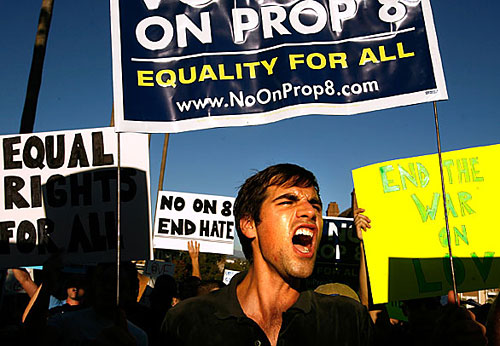
Today, the Supreme Court will decide whether to maintain a temporary stay on the Ninth Circuit order to broadcast the Prop 8 trial over YouTube. Just this Monday, the Court found that there was sufficient risk of irreparable harm to justify blocking the court broadcast temporarily.
Although the court's reasons were sparse, the petition, filed by Prop 8 supporters, argues that "the record is already replete with evidence showing that any publicizing of support for Prop 8 has inevitably led to harassment, economic reprisal, threats, and even physical violence." The Court agreed that "irreparable harm" would result if the broadcast was permitted.
This is troubling for a number of reasons.
First, the harassment and economic reprisal so sensationally referred to in the Prop 8 emergency petition is nothing more than public outcry against bigoted individuals using their time and money to actively attack the rights of their fellow citizens. Economic reprisal, specifically, [read boycott] is an age-old, legal political tool used in such important and lauded campaigns as the South African Divestment Movement. If people want to appear on record as supporters of discriminatory views, it is to be expected and encouraged that those who disagree with their position should use any legal avenue to oppose their movement.
Second, there is no evidence that those Prop 8 supporters who have publicly announced their opposition to equality have faced significant physical violence. Even if isolated incidents have occurred, these do not come close to the physical threats and violence anti-gay rights advocates perpetrate everyday. Gay-bashing and other LGBT motivated hate crimes have a long and rich history in the United States. If any group should be accused of using violence, it most certainly is not the minority attempting to pursue legal solutions to the long term violation of their rights.
None of the LGBT individuals testifying at this trial - who are taking significant risks of reprisal themselves - have argued that they might suffer from irreparable harm. They recognize that the irreparable harm standard sets a high bar, a significant threat that goes beyond general opposition to unpopular views or identities.
The public's interest in access to information is strong. It is stronger still when the topic is one of such public importance and the focus of such public debate and scrutiny. This is the reality with which Judge Walker was trying to grapple. He did so by encouraging dissemination of judicial information through a medium that is cheap, accessible and likely to reach those individuals around the country who have a vested interest in the proceedings, but cannot attend court personally.
The Supreme Court temporarily undid that project. Instead of protecting the rights of the minority, finally able to air their concerns, history and struggle in an impartial forum, they have used their power to offer a sheltered and safe forum for individuals attempting to uphold a measure that facilitated majority oppression of minority rights.
There is something wrong with this picture. The Court should lift the temporary stay and permit public access, real access, to the important proceedings occurring in the California District Court.
